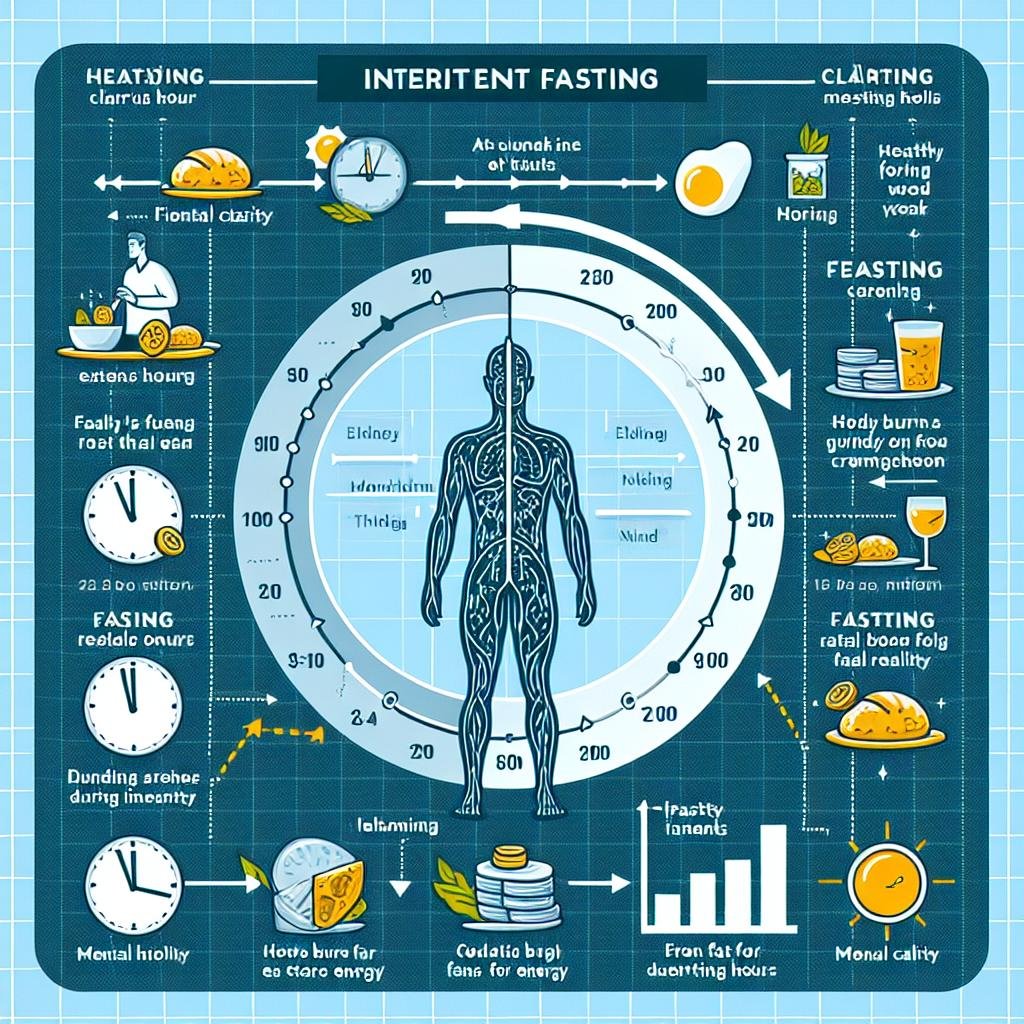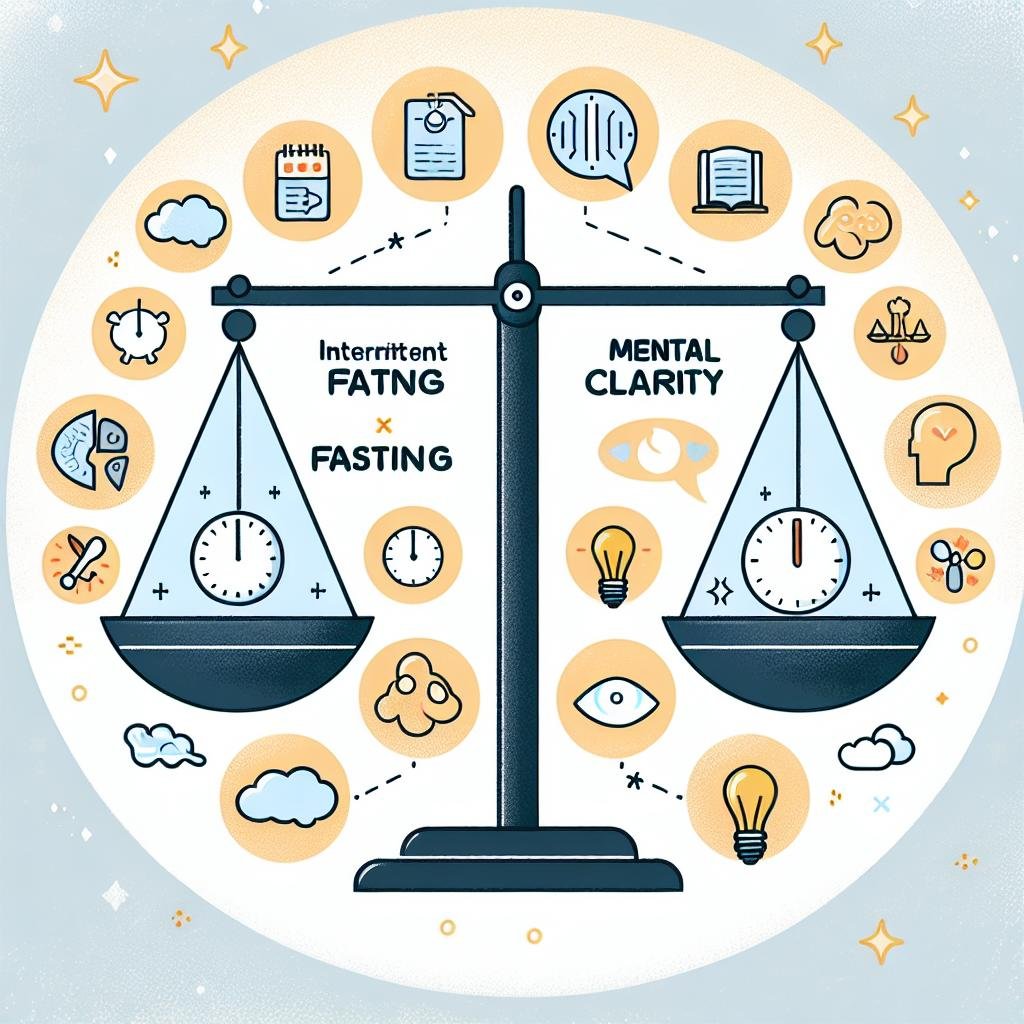In a world where the demands of daily life often clash with our quest for mental acuity, the concept of intermittent fasting has emerged as a beacon of hope for those seeking clarity and focus. More than just a dietary trend, intermittent fasting invites us to reconsider our relationship with food and time, suggesting that the hours spent away from our plates could hold the key to unlocking enhanced cognitive abilities. But what is the science behind this intriguing connection? As we delve into the intricate interplay between fasting and mental clarity, we’ll uncover the physiological mechanisms that may explain why many individuals report heightened concentration and creativity during fasting periods. Join us on a journey that explores the potential benefits of this ancient practice, providing insights that could reshape not just our diets but also our minds.
The Science Behind Intermittent Fasting and Cognitive Function
Intermittent fasting (IF) has gained popularity not only as a weight management tool but also for its potential cognitive benefits. Research suggests that when the body enters a fasted state, it triggers several metabolic and cellular processes that may enhance brain function. Notably, the decrease in insulin levels during fasting facilitates the production of brain-derived neurotrophic factor (BDNF), a protein crucial for neuroplasticity, learning, and memory. This process may lead to improved focus, clarity, and overall cognitive performance.
Moreover, intermittent fasting promotes autophagy, the body’s natural method of cleaning out damaged cells and regenerating new ones. This process is believed to protect the brain against neurodegenerative diseases and age-related decline. Some studies indicate that intermittent fasting can lead to increased neuronal resistance to stress and a reduction in inflammation, both of which are vital for maintaining cognitive health. the potential connection between fasting and enhanced mental clarity is not only intriguing but backed by emerging scientific evidence highlighting the profound impact of dietary practices on brain function.

Unlocking the Brains Potential Through Structured Eating Patterns
Structured eating patterns, such as intermittent fasting, can significantly enhance cognitive function by optimizing the brain’s energy utilization. During fasting periods, the body shifts from using glucose as its primary fuel to burning fat, leading to an increase in ketone production. This metabolic change not only fuels the brain but also promotes the growth of new neurons, a process known as neurogenesis. Scientific studies have shown that this state can enhance mental performance, increase sharpness, and improve memory retention. Moreover, the time-restricted nature of intermittent fasting encourages mindful eating, reducing the brain’s decision fatigue associated with constant food availability.
The psychological benefits of structured eating patterns are equally compelling. Many individuals report improved focus and clarity during fasting, as there are fewer distractions from frequent meals or snacks. This can lead to enhanced productivity and creativity, allowing for deeper engagement in cognitive tasks. Furthermore, intermittent fasting can help in stabilizing mood and reducing anxiety, leading to a more balanced mental state. Here are some key points that illustrate this connection:
- Improved Focus: Reduced hunger interruptions enhance concentration.
- Neurogenesis: Increased ketone production supports brain health.
- Enhanced Memory: Neuroplasticity thrives in a fasting state.
- Mood Stabilization: Regular fasting can mitigate stress levels.

Practical Tips for Enhancing Mental Clarity with Intermittent Fasting
Improving mental clarity through intermittent fasting can be as simple as building a daily routine that aligns with your body’s natural rhythms. Start by choosing an eating window that suits your lifestyle, such as 16/8, where you fast for 16 hours and eat during an 8-hour window. During your fasting period, stay well-hydrated; drinking water, herbal teas, or black coffee can enhance cognitive function without breaking your fast. Additionally, make a conscious effort to reduce distractions during meals and focus on your food. This mindfulness approach can help you better appreciate what you eat and foster a stronger connection between body and mind.
To further boost your mental acuity, consider incorporating nutrient-rich foods during your eating periods. Foods high in omega-3 fatty acids, antioxidants, and vitamins have been shown to improve brain health. Here’s a quick overview of some excellent options to include in your meals:
| Food | Benefit |
|---|---|
| Fatty Fish (Salmon, Mackerel) | Rich in omega-3s that support cognitive function |
| Blueberries | Packed with antioxidants that may delay brain aging |
| Nuts (Walnuts, Almonds) | High in healthy fats and vitamin E, promoting brain health |
| Leafy Greens (Spinach, Kale) | Contain vital nutrients like folate, which may enhance brain function |
Lastly, to maximize the clarity benefits of intermittent fasting, it’s crucial to maintain a regular sleep schedule. Sleep and mental clarity go hand in hand; inconsistent sleep can hinder cognitive function and memory. Aim for 7-9 hours of quality sleep each night and consider integrating relaxation techniques like meditation or deep breathing exercises before bedtime. Such practices can not only support better sleep but also improve focus and overall concentration during waking hours.

The Long-Term Effects of Fasting on Brain Health and Performance
The practice of fasting has garnered attention beyond its physical health benefits, particularly in its potential to enhance brain function and cognition. Research indicates that periods of fasting promote neuroplasticity, the brain’s ability to adapt and reorganize itself by forming new neural connections. This adaptability is closely linked to the increase in brain-derived neurotrophic factor (BDNF), a protein that supports the survival of existing neurons and encourages the growth of new ones. Furthermore, intermittent fasting may lead to improved insulin sensitivity and reduced inflammation, both of which play critical roles in maintaining optimum cognitive function and may protect against neurodegenerative diseases.
In addition to neurochemical changes, fasting can also influence behavioral aspects linked to mental clarity and focus. Many practitioners report enhanced concentration and mental acuity during fasting periods. Some key benefits include:
- Improved Focus: Many find it easier to concentrate when they are not encumbered by frequent meals.
- Heightened Energy Levels: A lack of food can lead the body to tap into fat stores, providing sustained energy.
- Reduced Brain Fog: By minimizing insulin spikes, fasting can eliminate the drowsiness that often follows a heavy meal.
Understanding these long-term effects reveals a potential paradigm shift in how we approach cognitive wellness. Below is a summary highlighting the relation between fasting practices and specific cognitive benefits:
| Fasting Type | Cognitive Benefit |
|---|---|
| 16:8 Method | Enhanced focus and concentration |
| 24-Hour Fast | Increased neuroplasticity |
| Alternate-Day Fasting | Improved memory retention |
In Summary
the intricate dance between intermittent fasting and mental clarity unfolds as a fascinating journey into the potential of our minds and bodies. As we’ve explored, the science suggests that this age-old practice may foster not just physical benefits, but a sharpened mental acuity that can enhance our daily lives. Whether you’re considering a fasting regimen to boost focus or merely curious about its cognitive implications, it’s clear that the connection is worth deeper exploration. As with any lifestyle change, individual experiences may vary, calling for a mindful approach that respects your unique rhythms. As you embark on your own path towards greater mental clarity, remember that the adventure lies not only in the results but in the process of discovery itself. Keep questioning, experimenting, and learning—your mind, and perhaps your fasting schedule, may just surprise you.

